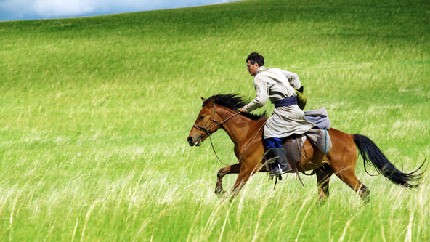
Anne Thompson, Indiewire про «Тотем вовка» та особливості копродукції, які унаочнюють фільми, що їх висувають на «Оскар» у номінації «Найкращий іншомовний фільм».
While the Academy has accepted 81 submissions for the foreign language Oscar, it rejected the initial would-be entry for China.
The country’s first swing was for China Film Co’s big-budget Mongolian wilderness adventure “Wolf Totem” (Columbia Pictures, September 11), the 13th feature from French director Jean-Jacques Annaud (“Quest for Fire”), who shot in Mandarin and Mongolian. In 1976, Annaud won the foreign Oscar for France (Ivory Coast . – БУК) for Africa-set “Black and White in Color,” which brought him as a young man to Cameroon, so he understood “Wolf Totem,” which is based on a 2004 bestseller by Jiang Rong, about city dwellers discovering a strange landscape. In the film two young Beijing students are sent to live among the nomadic herdsmen of Inner Mongolia.
China had reason to be confident in their choice, which was a $110 million-grosser in China, as it was the second year running that the country was submitting a Sino-French co-production, after Philippe Muyl’s rural family drama “The Nightingale.” China submitted the film even though, ironically, China still bans Annaud’s films “Seven Years in Tibet” and “The Lover.” But Annaud did assemble his key European/American crew, including cinematographer Jean-Marie Dreujou and late composer James Horner (who delivered a soaring score, one of his last). So even though he worked with a Chinese cast and crew, the Academy deemed there to be too few contributors from China, which had to submit another film instead. Thus, China ran with “Go Away Mr. Tumor,” a summer box office success overseas.
The Academy eligibility rules for the foreign Oscar have less to do with the actual language —as long as it’s not in English, it’s fine—as it does with the nationality of the people financing, shooting, and submitting the film. Thus France submitted Deniz Gamze Ergüven’s Turkish-language film “Mustang” as a French co-production (some 14 production/financing entities are listed on IMDb), and Ireland submitted Spanish-language “Viva,” which Irish filmmaker Paddy Breathnach and his crew shot in Cuba.
The United Kingdom submitted a Welsh-language film, Kevin Allen’s “Under Milk Wood,” starring Rhys Ifans. Spain’s “Flowers,” backed by a combo of Basque and Spanish production companies, is not in Spanish but rather the Basque language. And Israel submitted its first entry in Farsi, “Baba Joon,” a Metro Prods.-United King production set within the country’s Iranian Jewish culture, starring Navid Negabhan (“Homeland”) as an immigrant who wants to train his resistant son in the family trade. That’s because the film won Israel’s Ophir Best Picture award: that winner is always sent to contend for the Oscar.
Anne Thompson, Indiewire, 12 жовтня 2015 року
